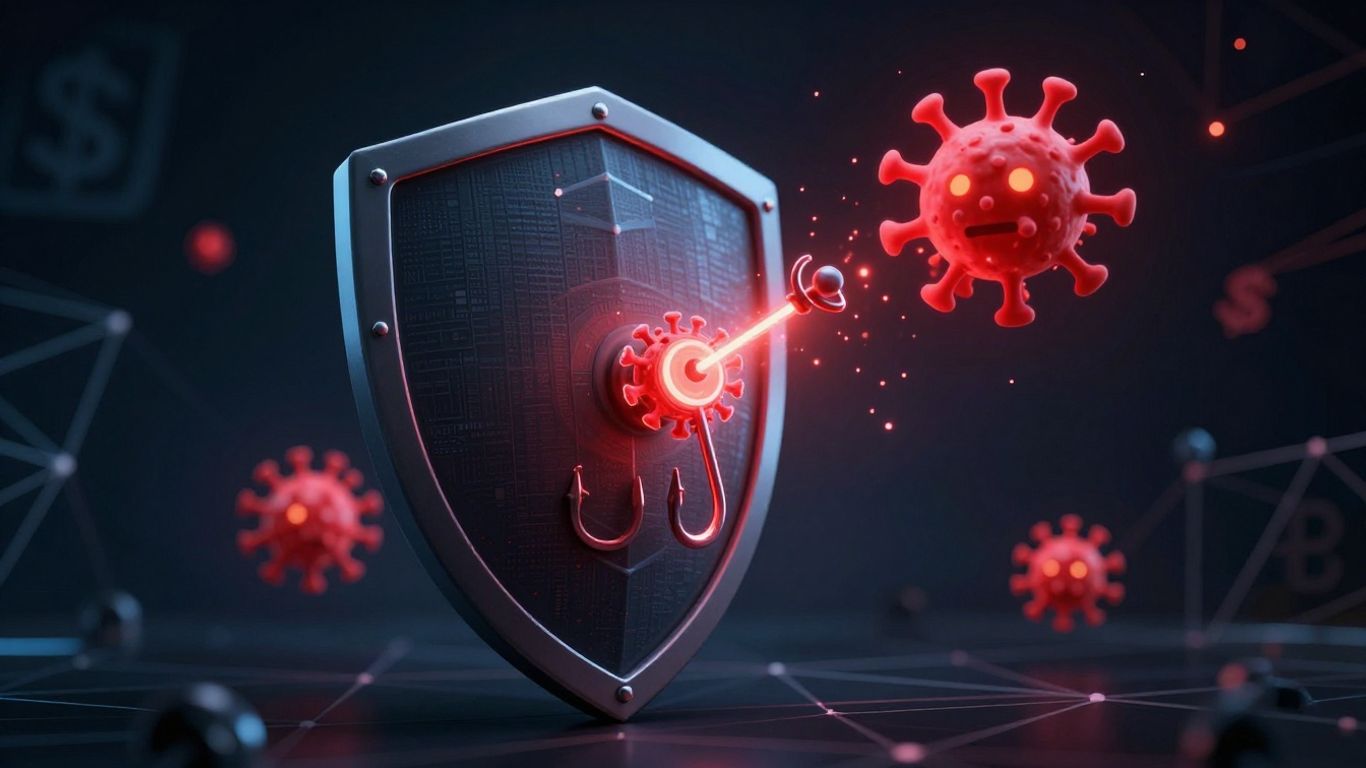[ newsletter ]
Stay ahead of Web3 threats—subscribe to our newsletter for the latest in blockchain security insights and updates.
Thank you! Your submission has been received!
Oops! Something went wrong. Please try again.
Explore how AI enhances smart contract security and prevents phishing attacks in the evolving blockchain landscape.





As technology evolves, smart contracts are becoming more popular for their ability to automate agreements on blockchains. However, they also face serious security threats, including phishing attacks. This is where artificial intelligence (AI) comes into play. AI can help detect and prevent these attacks, making smart contracts safer for everyone. In this article, we will explore how AI can enhance the security of smart contracts and reduce the risks associated with phishing.
Smart contracts are like digital agreements that automatically execute when certain conditions are met. They are built on blockchain technology, which makes them secure and transparent. These contracts help reduce the chances of human error and fraud.
Smart contracts can have various vulnerabilities that may lead to significant losses. Some common issues include:
Ensuring the security of smart contracts is crucial. Vulnerabilities can lead to massive financial losses, as seen in past incidents where millions were stolen. Developers must understand these risks before creating smart contracts.
Keeping smart contracts secure is not just about coding; it’s about understanding the potential risks and taking proactive measures to prevent them.

Artificial Intelligence (AI) plays a crucial role in identifying weaknesses in smart contracts. AI-driven tools can analyze code quickly, finding flaws that might be missed by human auditors. Here are some key techniques:
Automated audits powered by AI can significantly reduce the time and cost of security checks. For instance, the Veritas protocol has shown a potential 90% cost reduction in audits. This allows for:
AI can also forecast potential security threats by analyzing data patterns. This proactive approach helps in:
By integrating AI into smart contract security, we can create a more resilient and efficient system that not only detects vulnerabilities but also prevents them from being exploited.
AI can help identify unusual activities in smart contracts. By monitoring transaction patterns, these systems can flag any suspicious behavior. For example:
These alerts allow developers to investigate potential phishing attempts before they escalate.
AI can also enhance security by analyzing user behavior. This involves:
This proactive approach helps in catching threats early.
AI tools can analyze vast amounts of data to detect fraud patterns. They can:
In summary, AI-powered tools are essential for enhancing the security of smart contracts against phishing attacks. They not only help in identifying vulnerabilities but also in preventing potential exploits, making the blockchain ecosystem safer for everyone.
The integration of AI in smart contract security is not just a trend; it is a necessity for safeguarding digital assets in an increasingly complex threat landscape.

AI has been successfully integrated into various smart contract security systems. Here are some notable examples:
Despite advancements, there have been lessons learned from breaches:
The future looks promising for AI in smart contract security. Here are some trends to watch:
AI is not just a tool; it’s becoming a vital partner in the fight against smart contract vulnerabilities.
Using AI in smart contracts raises serious privacy issues. Smart contracts often handle sensitive information, such as financial transactions. If data isn't properly protected, it could be exposed, leading to potential misuse. Developers must ensure that any AI systems used respect user privacy and comply with regulations.
AI systems can be vulnerable to adversarial attacks. Malicious actors might manipulate inputs to trick AI into making incorrect decisions. This can undermine the security of smart contracts. To combat this, developers need to implement robust security measures and continuously monitor AI performance.
While AI can automate many processes, it's crucial to maintain a balance between automation and human oversight. Relying solely on AI can lead to missed vulnerabilities or errors. A collaborative approach, where AI assists human experts, can enhance security while ensuring thorough checks are in place.
The integration of AI in smart contracts is promising, but it must be approached with caution to avoid potential pitfalls.
By addressing these challenges, we can better harness the power of AI to enhance smart contract security while minimizing risks.
The future of smart contract security is bright, with AI technologies evolving rapidly. These advancements will likely include:
As smart contracts become more popular, the threats they face will also change. Some potential threats include:
To tackle these challenges, collaboration will be key. This could involve:
The integration of AI with smart contracts is not just an enhancement; it is a transformative leap that holds the promise of making decentralized systems more intelligent, secure, and user-centric. Smart contracts: where are we now and does AI have a role?
By focusing on these trends, we can create a safer environment for smart contracts, ensuring they remain a reliable tool in the digital economy.
In summary, protecting smart contracts from phishing attacks is crucial as their use grows in the digital world. By using artificial intelligence, we can spot and stop these threats more effectively. AI helps us find weaknesses in smart contracts and alerts us to unusual activities that might signal a problem. This combination of AI and smart contracts not only makes them safer but also builds trust among users. As technology continues to evolve, we must keep improving our defenses against phishing and other cyber threats. Embracing AI in this fight will help ensure that smart contracts remain secure and reliable.
Smart contracts are digital agreements that run on a blockchain. They automatically execute actions when certain conditions are met.
Smart contracts can have bugs or flaws in their code, making them easy targets for hackers.
AI can spot vulnerabilities in the code, monitor for unusual activity, and even suggest fixes in real time.
Some AI tools include anomaly detection systems and behavior-based security measures that help keep smart contracts safe.
AI can struggle with privacy issues, bad actors trying to trick the systems, and the need for human oversight.
AI is expected to become even better at spotting threats and improving the overall safety of smart contracts.


